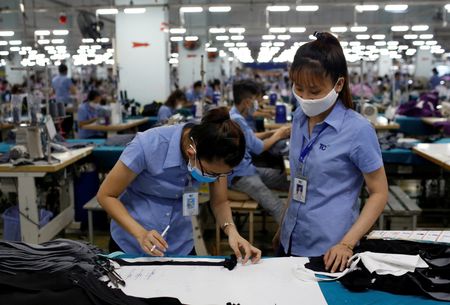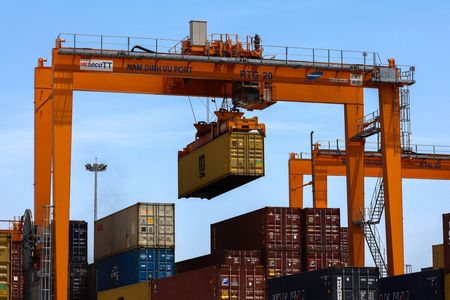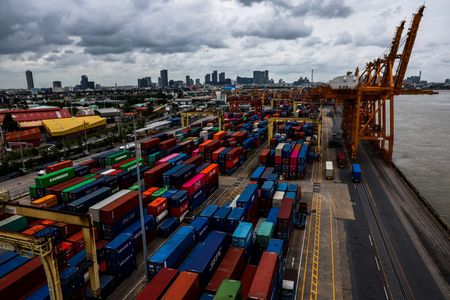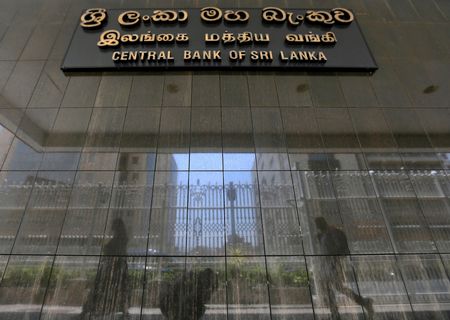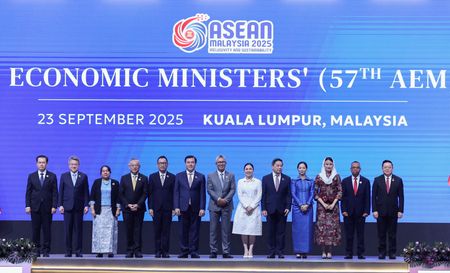By Francesco Guarascio
HANOI (Reuters) -European Union officials plan to press Vietnam on Friday to lift administrative barriers on EU goods, as the bloc’s trade deficit with Hanoi expands amid global trade tensions, according to two European officials and a draft document.
After a tariff-slashing free trade agreement signed in 2019, Vietnam has become the EU’s largest trading partner in Southeast Asia, with bilateral trade reaching 67 billion euros ($79 billion) last year, according to the European Commission.
However, trade flows remain largely unbalanced, with the EU’s trade deficit rising nearly 20% last year to approximately $50 billion, data show.
And the gap for the 27-nation bloc keeps growing, as it reached nearly $30 billion in the first half of this year and accelerated in July, EU data show.
EU trade commissioner Maros Sefcovic will meet Vietnamese officials on Friday as part of a trip to Southeast Asian which includes Indonesia and Malaysia.
Discussions will focus on removing non-tariff barriers for EU products such as food, pharmaceuticals and automobiles, according to two European officials and the draft agenda of a meeting Sefcovic will attend in Hanoi.
A spokesperson for the European Commission did not respond to a request for comment.
POTATOES, POULTRY BARRED
Among dozens of products that cannot be exported because of administrative issues are apples and kiwis from Italy, poultry from Spain, potatoes from Germany and pork meat from multiple EU countries, five European officials said.
Some farm products have been prevented from reaching Vietnamese consumers despite being deemed safe by local authorities, because of delays in obtaining certificates, two of the officials said.
Vietnam’s trade ministry did not reply to a request for comment. Delays are often attributed by the Vietnamese to lack of personnel, European officials said.
The talks come amid broader trade pressures as both Hanoi and Brussels seek to diversify markets for their products while facing new tariffs from the United States.
Vietnam’s exports to the United States, its largest market, could drop by a fifth from the impact of the new 20% duties levied on its goods from the U.S., making it the most vulnerable country in Southeast Asia, according to estimates by the United Nations Development Programme.
EU officials are keen to strengthen ties with Hanoi but privately acknowledge that Vietnam should do more to meet trade partners’ demands, especially after it made trade concessions to Washington under threat of punitive tariffs.
At Friday’s meeting, officials will also discuss Vietnam’s new consumption tax, according to the draft agenda. One official said that the levy could hit European wine exports.
Two European officials said long-standing concerns about EU exports of pharmaceutical products and cars were being gradually addressed.
The Vietnamese side will raise issues related to rice exports and EU tariffs on carbon-intensive imports, such as steel, and regulations on corporate due diligence, according to the draft agenda.
($1 = 0.8476 euros)
(Reporting by Francesco Guarascio; Additional reporting by Philip Blenkinsop in Brussels and Phuong Nguyen in Hanoi; Editing by Jacqueline Wong)

